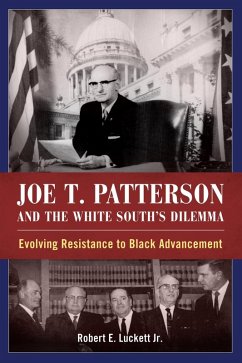As Mississippi's attorney general from 1956 to 1969, Joe T. Patterson led the legal defense for Jim Crow in the state. He was inaugurated for his first term two months before the launch of the Sovereignty Commission-charged "to protect the sovereignty of Mississippi from encroachment thereon by the federal government"-which made manifest a century-old states' rights ideology couched in the rhetoric of massive resistance. Despite the dubious legal foundations of that agenda, Patterson supported the organization's mission from the start and served as an ex-officio leader on its board for the rest of his life.
Patterson was also a card-carrying member of the segregationist Citizens' Council and, in his own words, had "spent many hours and driven many miles advocating the basic principles for which the Citizens' Councils were originally organized." Few ever doubted his Jim Crow credentials. That is until September 1962 and the integration of the University of Mississippi by James Meredith.
That fall Patterson stepped out of his entrenchment by defying a circle of white power brokers, but only to a point. His seeming acquiescence came at the height of the biggest crisis for Mississippi's racist order. Yet even after the Supreme Court decreed that Meredith must enter the university, Patterson opposed any further desegregation and despised the federal intervention at Ole Miss. Still he faced a dilemma that confronted all white southerners: how to maintain an artificially elevated position for whites in southern society without resorting to violence or intimidation. Once the Supreme Court handed down its decision in Meredith v. Fair, the state attorney general walked a strategic tightrope, looking to temper the ruling's impact without inciting the mob and without retreating any further. Patterson and others sought pragmatic answers to the dilemma of white southerners, not in the name of civil rights but to offer a more durable version of white power. His finesse paved the way for future tactics employing duplicity and barely yielding social change while deferring many dreams.
Patterson was also a card-carrying member of the segregationist Citizens' Council and, in his own words, had "spent many hours and driven many miles advocating the basic principles for which the Citizens' Councils were originally organized." Few ever doubted his Jim Crow credentials. That is until September 1962 and the integration of the University of Mississippi by James Meredith.
That fall Patterson stepped out of his entrenchment by defying a circle of white power brokers, but only to a point. His seeming acquiescence came at the height of the biggest crisis for Mississippi's racist order. Yet even after the Supreme Court decreed that Meredith must enter the university, Patterson opposed any further desegregation and despised the federal intervention at Ole Miss. Still he faced a dilemma that confronted all white southerners: how to maintain an artificially elevated position for whites in southern society without resorting to violence or intimidation. Once the Supreme Court handed down its decision in Meredith v. Fair, the state attorney general walked a strategic tightrope, looking to temper the ruling's impact without inciting the mob and without retreating any further. Patterson and others sought pragmatic answers to the dilemma of white southerners, not in the name of civil rights but to offer a more durable version of white power. His finesse paved the way for future tactics employing duplicity and barely yielding social change while deferring many dreams.
Dieser Download kann aus rechtlichen Gründen nur mit Rechnungsadresse in A, D ausgeliefert werden.









